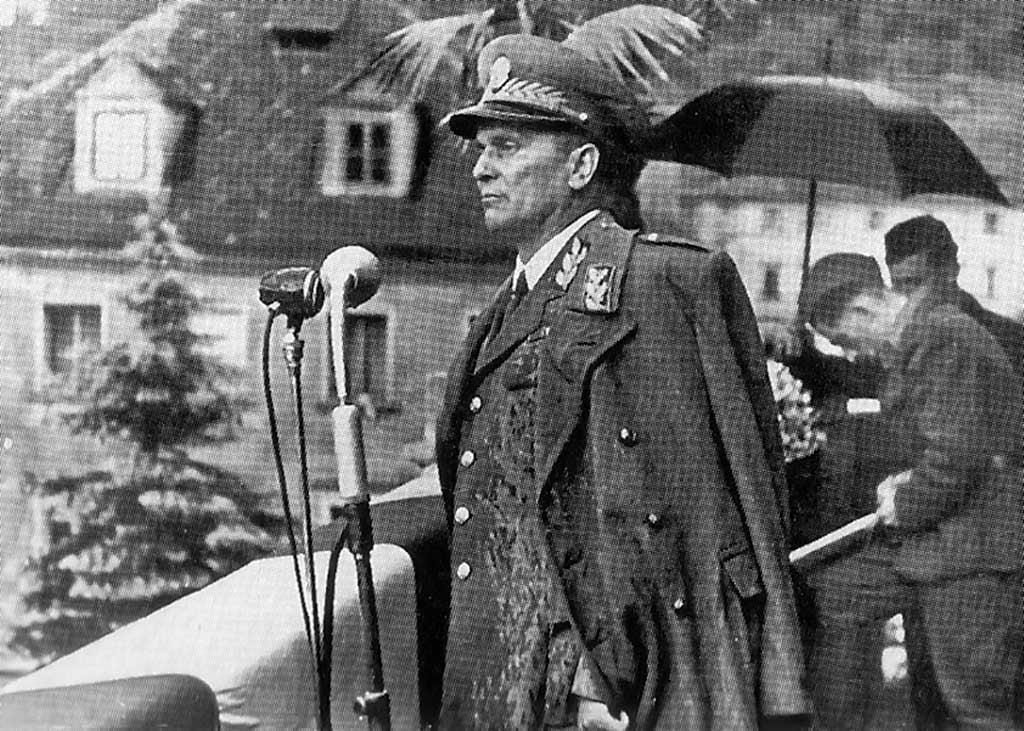“For nothing is hidden, that will not be revealed; nor anything secret, that will not be known and come to light,” reads the biblical truth. This seems to be the case with the Pliberk massacre, too. The events of that time were the subject of a recent article in the European Conservative media outlet, on the occasion of the publication of the Spanish translation of a book by the well-known researcher of post-war communist crimes, Roman Leljak. In the interview, Álvaro Peñas discusses the responsibility of Tito, Kidrič and the British military leadership for the post-war massacres of Croatians and Slovenians, as well as the importance of historical memory without political conditioning.
As we know, the majority of the Croatian Ustasha army, including Serbian chetnik units and Slovenian Home Guard units, withdrew through Slovenia to the Austrian border town of Pliberk. After their capture, the British army sent some 95,000 people back to Yugoslavia by train on the pretext that they were on their way to Italy. Almost all of them were murdered in extrajudicial killings over the next month, including women, elderly people, children and even babies.
The interview first gives a general assessment of the number of those murdered in Pliberk. Croatian historians have so far stated that around 95 thousand people were murdered, while Peñas puts the figure at 80 thousand, bearing in mind that, especially in Slovenia, there are still many intact graves, so the final number of people murdered could be closer to 100 thousand. According to the Spaniard, the fate of these people was determined in 1945 at the Yalta Conference of the Allies, when Stalin demanded the extradition of all Soviet citizens, and the same concept was then applied to the citizens of Yugoslavia who had fought against the Communist troops.
The author of the translation then talks about the real motives for the massacres. As he states, the war in Yugoslavia was brutal, with massacres and revenge being the rule, not the exception. The Pliberk massacres were characterised by the Communists’ targeting of their real opponents (i.e. their own countrymen, not the occupying army), those they called class enemies, entrepreneurs, the bourgeoisie and the clergy – in short, anyone who might oppose the Communist regime. “After the Pliberk massacre and the death marches to the concentration camps, the survivors had to face rigged trials that usually ended in death sentences or long prison sentences and, of course, the confiscation of property,” says Peñas.
Tito’s responsibility for the massacre
In the interview, he then goes on to discuss the responsibility of the Communist leader Josip Broz – Tito for the massacres and the attempts to erase his responsibility. One such attempt was an “order” dated 14th of May 1945, in which he ordered that prisoners should not be executed. But the authenticity of the order has been questioned by many historians, the Spaniard says, adding that the authenticity of the order is all the more questionable in light of the words spoken by the communist dictator in his famous speech in Ljubljana: “As for those traitors who were in the country itself, in each nation separately, that is a matter of the past. The hand of justice, the avenging hand of our people, has already reached an overwhelming majority, but only a small minority of traitors have managed to escape under the patronage of patrons outside our country. This minority will never again see our wild mountains, our flowering fields. If it does happen, it will be for a very short time.”
Peñas also touches on the reputation that the communist dictator still enjoys in the West. As he said in the interview, this “reputation” still stems from Tito’s actions after the war, when he distanced himself from Stalin’s influence (the “Cominform – Information Bureau of the Communist and Workers’ Parties” period) and positioned Yugoslavia in the international arena as a potential ally of the West, which the latter accepted – not out of sympathy for the then-totalitarian government, but as a kind of political convenience. He is also regarded abroad as a person who managed to quell inter-ethnic hatreds, and the intensive campaign to normalise his outward image cannot be ignored: Peñas cites the making of the film “Sutjeska,” (The Gorge), in which Tito was portrayed by Richard Burton, as an example. In the face of all this, his mass crimes remain without real reflection and historical condemnation.
Hiding a crime
The interlocutors then focus on the great effort to hide the crime committed and the attempts to relativise it in the modern era. Towards the end of communist Yugoslavia, the “rumours” of the murders were labelled as fascist propaganda, while the diction of the Slovenian political left, with minor differences, has remained unchanged to this day. In the interview, Peñas also mentions the sympathy of the Slovenian “political elite” with the Reich’s totalitarian system, citing as an example the Minister of Culture, Asta Vrečko, who recently posed in front of a statue of Josip Broz Tito, and the words of Ljubljana Mayor Zoran Janković, who said that there would be no graves for “traitors” in Ljubljana.
The importance of historical memory
The interview concludes with a reflection on the importance of a correct historical memory, unencumbered by political conditioning and free of “political passions”. “Of course, the first step would be to honour the victims, regardless of which side they are on, but the reality is that the conditions for this are not present yet. Today, only about twenty countries recognise the Holodomor as genocide, despite the fact that the Russian invasion has greatly increased sympathy for Ukraine. We also have the Armenian genocide, more than a century on, which is recognised by only 31 countries,” Peñas concludes.
Gal Kovač


